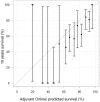External validation of Adjuvant! Online breast cancer prognosis tool. Prioritising recommendations for improvement
- PMID: 22087319
- PMCID: PMC3210791
- DOI: 10.1371/journal.pone.0027446
External validation of Adjuvant! Online breast cancer prognosis tool. Prioritising recommendations for improvement
Abstract
Background: Adjuvant! Online is a web-based application designed to provide 10 years survival probability of patients with breast cancer. Several predictors have not been assessed in the original Adjuvant! Online study. We provide the validation of Adjuvant! Online algorithm on two breast cancer datasets, and we determined whether the accuracy of Adjuvant! Online is improved with other well-known prognostic factors.
Patients and methods: The French data set is composed of 456 women with early breast cancer. The Dutch data set is composed of 295 women less than 52 years of age. Agreement between observation and Adjuvant! Online prediction was checked, and logistic models were performed to estimate the prognostic information added by risk factors to Adjuvant! Online prediction.
Results: Adjuvant! Online prediction was overall well-calibrated in the French data set but failed in some subgroups of such high grade and HER2 positive patients. HER2 status, Mitotic Index and Ki67 added significant information to Adjuvant! Online prediction. In the Dutch data set, the overall 10-year survival was overestimated by Adjuvant! Online, particularly in patients less than 40 years old.
Conclusion: Adjuvant! Online needs to be updated to adjust overoptimistic results in young and high grade patients, and should consider new predictors such as Ki67, HER2 and Mitotic Index.
Conflict of interest statement
Figures



References
-
- Blamey RW, Davies CJ, Elston CW, Johnson J, Haybittle JL, et al. Prognostic factors in breast cancer – the formation of a prognostic index. Clin Oncol. 1979;5:227–236. - PubMed
-
- Ravdin PM, Siminoff LA, Davis GJ, Mercer MB, Hewlett J, et al. Computer program to assist in making decisions about adjuvant therapy for women with early breast cancer. J Clin Oncol. 2001;19:980–991. - PubMed
-
- Early Breast Cancer Trialists' Collaborative Group. Polychemotherapy for early breast cancer: an overview of the randomised trials. Early Breast Cancer Trialists' Collaborative Group. Lancet. 1998;352:930–942. - PubMed
Publication types
MeSH terms
Substances
LinkOut - more resources
Full Text Sources
Medical
Research Materials
Miscellaneous

